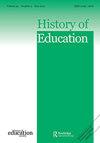从个人记忆到公共教育历史:对历史学家的挑战
IF 0.4
4区 教育学
Q4 EDUCATION & EDUCATIONAL RESEARCH
引用次数: 0
摘要
本文章由计算机程序翻译,如有差异,请以英文原文为准。
From personal memories to public histories of education: a challenge for the historian
ABSTRACT This article explores the possibilities that the study of personal memories offers to historians of education. All the arguments revolve around three questions: (1) What is your first memory? From this starting point we explore research dealing with autobiographical memories, both earliest and school memories, as well as future possibilities in educational historiography. (2) How would I like to be remembered? This question is related to the memories and archives of ‘the forgotten’ – in this case, schoolteachers ‒ and the role of historians as ‘heirs’ to these memories, in line with Walter Benjamin’s metaphor. (3) What happens when personal memories become public? This question leads us to reflect on the processes that convert academic narratives into public discourse. When this occurs, the historian loses control of these narratives and is confronted with a dilemma: to become a public intellectual or to go back to the privacy of his/her archives.
求助全文
通过发布文献求助,成功后即可免费获取论文全文。
去求助
来源期刊

History of Education
Multiple-
CiteScore
0.80
自引率
0.00%
发文量
70
期刊介绍:
History of Education has established itself as a leading, international, peer-reviewed journal, focusing on the history of education in all parts of the world. The journal is recognised as a key resource for both educationists and social historians alike. The journal publishes original research and major reviews of books in the history of education. Papers dealing with both formal and informal education systems, comparative education, policy-making, the politics and experience of education and pedagogy are welcomed.
 求助内容:
求助内容: 应助结果提醒方式:
应助结果提醒方式:


